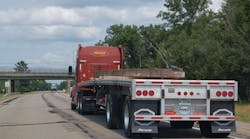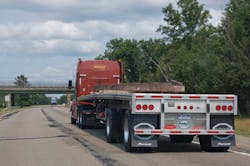And regardless of whether you think such efforts are good or bad, such rulemaking generates a broad impact not only upon those directly affected – mainly truck drivers in the above two cases mentioned – but generates significant ripple effects within the freight hauling business and often the economy as well.
[Stories providing deeper detail concerning the broader impact on trucking due to regulations can be found here and here.]
Yet what often gets lost in such transportation-focused regulatory discussions is that coping with the impact they create is not limited to the U.S.; it’s a global issue with all sorts of implications regarding the flow of trade.
Stuart Mann, global implementation manager with freight software firm WiseTech Global, recently penned some thoughts on this very issue that are worth contemplating.
“With the development of new markets and new products, global trade continues to generate new opportunities for those in the logistics industry,” he said. “Our reliance on these trade flows and the cost of getting them wrong create enormous challenges for those managing the supply chain.”As international trade, national security, and transportation safety are all increasingly going together in hand in hand, the spotlight is being shined more brightly on regulatory compliance.
“In recent years, with increasing globalization, everyone involved in international logistics has become increasingly aware of one geo-compliance regulation or another,” Mann (at left) noted. “It’s hard to avoid the frequently publicized news stories of companies receiving massive fines for shipping the wrong thing to the wrong place at the wrong time. Yet there are still international logistics organizations that do not have a deep understanding of the regulatory landscape.”
For example, he believes many freight forwarding companies became worldwide enterprises almost through the “back door” in a way by opening up local offices in different countries at the request of their major customers or by making acquisitions without fully understanding all the local procedures.
“There are still major international companies operating in many countries that are only just beginning to understand how to responsibly manage global compliance,” Mann pointed out.
“Compliance is multi-layered, multi-faceted, and ever-changing [and] I can understand why companies might delay or shy away from developing what I call a more effective geo-compliance strategy (GCS),” he added. “After all, the lack of global standards across the supply chain makes it appear almost impossible to do so. Even within areas of political and economic union, like the European Union (EU), members implement their own interpretation of regulations, and standards vary for just about everything and are often documented solely in the local languages.”
Of course, as Mann works for a freight-focused software firm, he thinks transportation and logistics companies can best stay ahead of the regulatory curve by investing in technology.
Yet while this may seem self-serving, he’s right in more ways than one, for how else can companies involved in transportation freight stay compliant not only with safety regulations but tax laws as well?
“The most comprehensive GCS solutions contain full, multi-language capabilities; financial accounting and reporting that eases the hassle of international transactions; tax rates, default rules, and invoice layouts for accurate returns; current customs regulations and procedures; supply chain security; and considerations of environmental compliance,” Mann explained. “Compliance software should enable forwarders to focus on what they do best, with the reassurance that local rules and regulations are covered no matter what country your business operates in.”
And operating transportation companies around the world is only getting more complicated due to rulemaking efforts that, in many cases, is choking off the supply of folks willing to do such work.For example, take a look at the second in a series of studies on the future of transport compiled Prof. Dirk Lohre with the Institute for Sustainability in Transport and Logistics (INLV) at Europe’s Heilbronn University on behalf of global truck component supplier ZF.
Based on interviews with 30 transportation experts, supplemented by the findings from 2,200 driver surveys and detailed questioning of 700 apprentice drivers in Europe, ZF’s study – entitled Zukunftsstudie FERNFAHRER – noted that new regulations governing the truck driving profession, particularly in Germany, are causing some issues.
One body of rules examined in detail by Lohre’s research team concern the Regulation on Driving Times and Rest Periods provisions implemented by the EU on April 11, 2007. Those rules govern permissible driving times as well as the length and sequences of the prescribed breaks and rest periods (sound familiar?)
Lohre (above at right) found that those new provisions are substantially increasing the business planning requirements in commercial road haulage.
One reason: frequent use of drivers to complete non-driver related activities (e.g. loading and unloading) makes it more difficult to comply with the “social provisions” of the new rules, since these times are not deemed breaks or rest periods.
As a result, less time is effectively available for driving, Lohre said.
Furthermore, breaches of the law governing driving personnel are the main issue affecting German trucks, with 80% of the majority of breaches found on German trucks during checks by that nation’s Federal Office for Long-Distance Goods Transport (BAG) relate to non-compliance with the rules relating to the law governing driving personnel – specifically driving times and rest periods, with approximately 40% of such “law breaches” relating to the improper use of mandated “tachographs” by drivers (devices analogous to ELDs on this side of the pond to a degree).
All of this combines into what Lohre dubs the “industrialization” of the transport business; a trend that he believes will require in his view a more “dependable political framework” that includes revisions to current regulations.
“More flexible regulations for driving and rest periods without increasing overall hours would meet the foreseeable requirements of the industry,” he explained.
That also includes in Lohre’s view an “urgent” need to create training networks, quality management for apprenticeships, working time models, and shift regulations that respond to the requirements of future driver generations for a better work-life balance.
Food for thought as the pace of regulatory deployment shows no signs of slacking either here in the U.S. or overseas.






